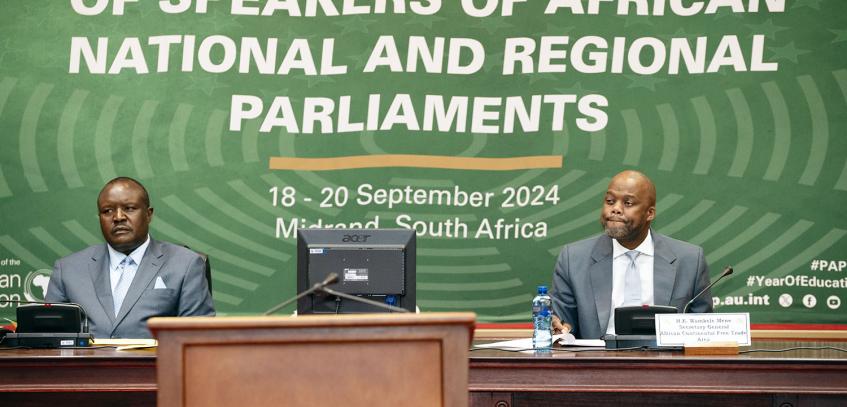The 12th Annual Conference of Speakers of African National and Regional Parliaments, held in Midrand, South Africa, alongside the Sitting of the Permanent Committees, provided a crucial platform to assess the progress of the African Continental Free Trade Area (AfCFTA) Agreement. As Africa moves toward deeper economic integration, this gathering showcased the milestones achieved and the challenges that remain in realizing the full potential of intra-African trade.
The conference also served as a vital forum for coordinating and harmonizing national and regional parliamentary frameworks, aimed at enhancing African economic integration and development through best parliamentary practices.
During the session, H.E Chief Fortune Charumbira, President of the Pan-African Parliament, along with other distinguished members and speakers, emphasized the transformative role of the AfCFTA in shaping Africa’s economic landscape. With 54 countries having signed the agreement and 47 already ratified, the momentum for implementation is strong. The AfCFTA represents Africa’s most ambitious effort to integrate economies, boost industrialization, and create jobs, especially for the continent’s growing youth population.
One of the significant indicators of progress, highlighted by HE Wamkele Mene, Secretary General of AfCFTA, during his presentation titled “Progress on the Implementation of the AfCFTA Agreement,” was the increase in the number of countries actively trading under the AfCFTA regime.
“The Guided Trade Initiative (GTI), which facilitates the flow of goods among African states, has expanded participation from seven to 39 countries,” said HE Mene. “This rise signals growing commitment across the continent, with an increasing number of small-scale traders, including women, benefiting from new market opportunities. According to Afreximbank data, intra-African trade grew by 3.2% in 2023, reaching $192.2 billion, reflecting the resilience and promise of the agreement even amid global economic challenges.”
A key focus of the discussions was the untapped potential of intra-African trade, which could exceed $69 billion in exports. By unlocking this potential, Africa’s intra-continental trade could rise to $261.6 billion, constituting 36% of the continent’s total trade volume. This would encompass a broad range of goods, from machinery and motor vehicle parts to food products and minerals, fostering diversified industrialization and value-added production across Africa.
Additionally, the Digital Trade Protocol and the Protocol on Women and Youth in Trade were recognized as major milestones. These protocols, adopted at the 37th African Union Summit in February, provide a robust legal foundation for advancing digital and inclusive trade on the continent. The digital economy, currently valued at $115 billion, is projected to reach $712 billion by 2050, driven by innovations and partnerships, particularly in financial technology.
Despite these achievements, challenges remain, especially in finalizing negotiations on rules of origin in key sectors like automotive and textiles. The harmonization of trade laws and the removal of barriers to free movement across Africa’s borders remain critical to the success of the AfCFTA.
The AfCFTA Secretariat has also launched initiatives focused on private sector engagement, supporting sectors such as agriculture, pharmaceuticals, and automotive production. Efforts to reduce transport and logistics costs and strengthen manufacturing capacity through strategic partnerships are gaining traction.
As the presentation concluded, there was a strong call for continued collaboration among African parliaments, governments, and private sector stakeholders to fully implement the AfCFTA. Commenting on the presentation, H.E Charumbira emphasized that the success of this ambitious agreement hinges on collective action, legislative support, and sustained investment to realize Africa’s dream of a unified, prosperous economic bloc.
The President also noted that the conference aligned with the African Union’s 2024 theme: *“Educate an African Fit for the 21st Century: Building Resilient Education Systems for Increased Access to Inclusive, Lifelong, Quality, and Relevant Learning in Africa.” He highlighted the continent’s commitment to transforming education systems to meet the challenges of the modern era.
“Our continent needs to invest much more in education. Education is the key tool for our progress and success. We urge our countries to direct their resources and energy toward education,” he stated.
-Ends-








